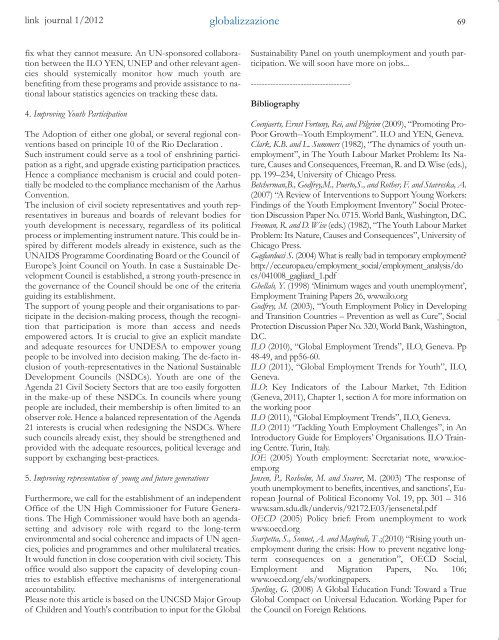Gennaio-marzo 2012 - Link Campus University
Gennaio-marzo 2012 - Link Campus University
Gennaio-marzo 2012 - Link Campus University
Create successful ePaper yourself
Turn your PDF publications into a flip-book with our unique Google optimized e-Paper software.
link journal 1/<strong>2012</strong> globalizzazione<br />
fix what they cannot measure. An UN-sponsored collaboration<br />
between the ILO YEN, UNEP and other relevant agencies<br />
should systemically monitor how much youth are<br />
benefiting from these programs and provide assistance to national<br />
labour statistics agencies on tracking these data.<br />
4. Improving Youth Participation<br />
The Adoption of either one global, or several regional conventions<br />
based on principle 10 of the Rio Declaration .<br />
Such instrument could serve as a tool of enshrining participation<br />
as a right, and upgrade existing participation practices.<br />
Hence a compliance mechanism is crucial and could potentially<br />
be modeled to the compliance mechanism of the Aarhus<br />
Convention.<br />
The inclusion of civil society representatives and youth representatives<br />
in bureaus and boards of relevant bodies for<br />
youth development is necessary, regardless of its political<br />
process or implementing instrument nature. This could be inspired<br />
by different models already in existence, such as the<br />
UNAIDS Programme Coordinating Board or the Council of<br />
Europe’s Joint Council on Youth. In case a Sustainable Development<br />
Council is established, a strong youth-presence in<br />
the governance of the Council should be one of the criteria<br />
guiding its establishment.<br />
The support of young people and their organisations to participate<br />
in the decision-making process, though the recognition<br />
that participation is more than access and needs<br />
empowered actors. It is crucial to give an explicit mandate<br />
and adequate resources for UNDESA to empower young<br />
people to be involved into decision making. The de-facto inclusion<br />
of youth-representatives in the National Sustainable<br />
Development Councils (NSDCs). Youth are one of the<br />
Agenda 21 Civil Society Sectors that are too easily forgotten<br />
in the make-up of these NSDCs. In councils where young<br />
people are included, their membership is often limited to an<br />
observer role. Hence a balanced representation of the Agenda<br />
21 interests is crucial when redesigning the NSDCs. Where<br />
such councils already exist, they should be strengthened and<br />
provided with the adequate resources, political leverage and<br />
support by exchanging best-practices.<br />
5. Improving representation of young and future generations<br />
Furthermore, we call for the establishment of an independent<br />
Office of the UN High Commissioner for Future Generations.<br />
The High Commissioner would have both an agendasetting<br />
and advisory role with regard to the long-term<br />
environmental and social coherence and impacts of UN agencies,<br />
policies and programmes and other multilateral treaties.<br />
It would function in close cooperation with civil society. This<br />
office would also support the capacity of developing countries<br />
to establish effective mechanisms of intergenerational<br />
accountability.<br />
Please note this article is based on the UNCSD Major Group<br />
of Children and Youth's contribution to input for the Global<br />
69<br />
Sustainability Panel on youth unemployment and youth participation.<br />
We will soon have more on jobs...<br />
------------------------------------<br />
Bibliography<br />
Coenjaerts, Ernst Fortuny, Rei, and Pilgrim (2009), “Promoting Pro-<br />
Poor Growth--Youth Employment”. ILO and YEN, Geneva.<br />
Clark, K.B. and L. Summers (1982), “The dynamics of youth unemployment”,<br />
in The Youth Labour Market Problem: Its Nature,<br />
Causes and Consequences, Freeman, R. and D. Wise (eds.),<br />
pp. 199–234, <strong>University</strong> of Chicago Press.<br />
Betcherman,B., Godfrey,M., Puerto,S., and Rother, F. and Stavreska, A.<br />
(2007) “A Review of Interventions to Support Young Workers:<br />
Findings of the Youth Employment Inventory” Social Protection<br />
Discussion Paper No. 0715. World Bank, Washington, D.C.<br />
Freeman, R. and D. Wise (eds.) (1982), “The Youth Labour Market<br />
Problem: Its Nature, Causes and Consequences”, <strong>University</strong> of<br />
Chicago Press.<br />
Gagliarducci S. (2004) What is really bad in temporary employment?<br />
http://ec.europa.eu/employment_social/employment_analysis/do<br />
cs/041008_gagliard_1.pdf<br />
Ghellab, Y. (1998) ‘Minimum wages and youth unemployment’,<br />
Employment Training Papers 26, www.ilo.org<br />
Godfrey, M. (2003), “Youth Employment Policy in Developing<br />
and Transition Countries – Prevention as well as Cure”, Social<br />
Protection Discussion Paper No. 320, World Bank, Washington,<br />
D.C.<br />
ILO (2010), “Global Employment Trends”, ILO, Geneva. Pp<br />
48-49, and pp56-60.<br />
ILO (2011), “Global Employment Trends for Youth”, ILO,<br />
Geneva.<br />
ILO: Key Indicators of the Labour Market, 7th Edition<br />
(Geneva, 2011), Chapter 1, section A for more information on<br />
the working poor<br />
ILO (2011), “Global Employment Trends”, ILO, Geneva.<br />
ILO (2011) “Tackling Youth Employment Challenges”, in An<br />
Introductory Guide for Employers’ Organisations. ILO Training<br />
Centre. Turin, Italy.<br />
IOE (2005) Youth employment: Secretariat note, www.ioeemp.org<br />
Jensen, P., Rosholm, M. and Svarer, M. (2003) ‘The response of<br />
youth unemployment to benefits, incentives, and sanctions’, European<br />
Journal of Political Economy Vol. 19, pp. 301 – 316<br />
www.sam.sdu.dk/undervis/92172.E03/jensenetal.pdf<br />
OECD (2005) Policy brief: From unemployment to work<br />
www.oecd.org<br />
Scarpetta, S., Sonnet, A. and Manfredi, T .;(2010) “Rising youth unemployment<br />
during the crisis: How to prevent negative longterm<br />
consequences on a generation”, OECD Social,<br />
Employment and Migration Papers, No. 106;<br />
www.oecd.org/els/workingpapers.<br />
Sperling, G. (2008) A Global Education Fund: Toward a True<br />
Global Compact on Universal Education. Working Paper for<br />
the Council on Foreign Relations.



